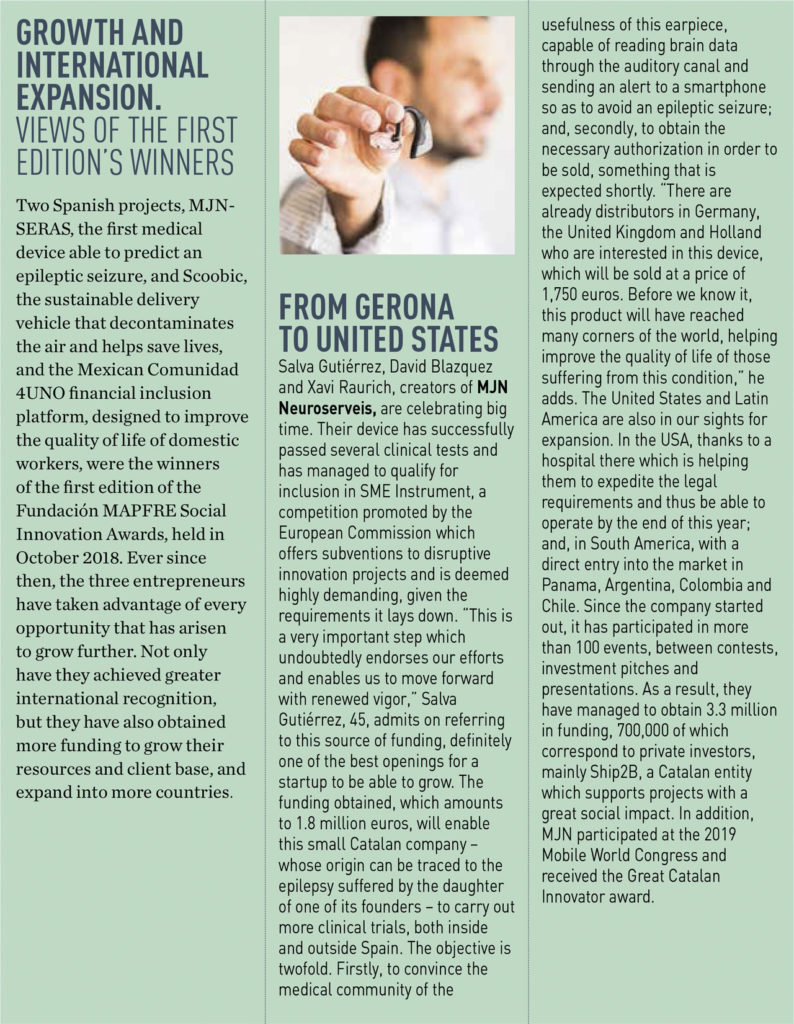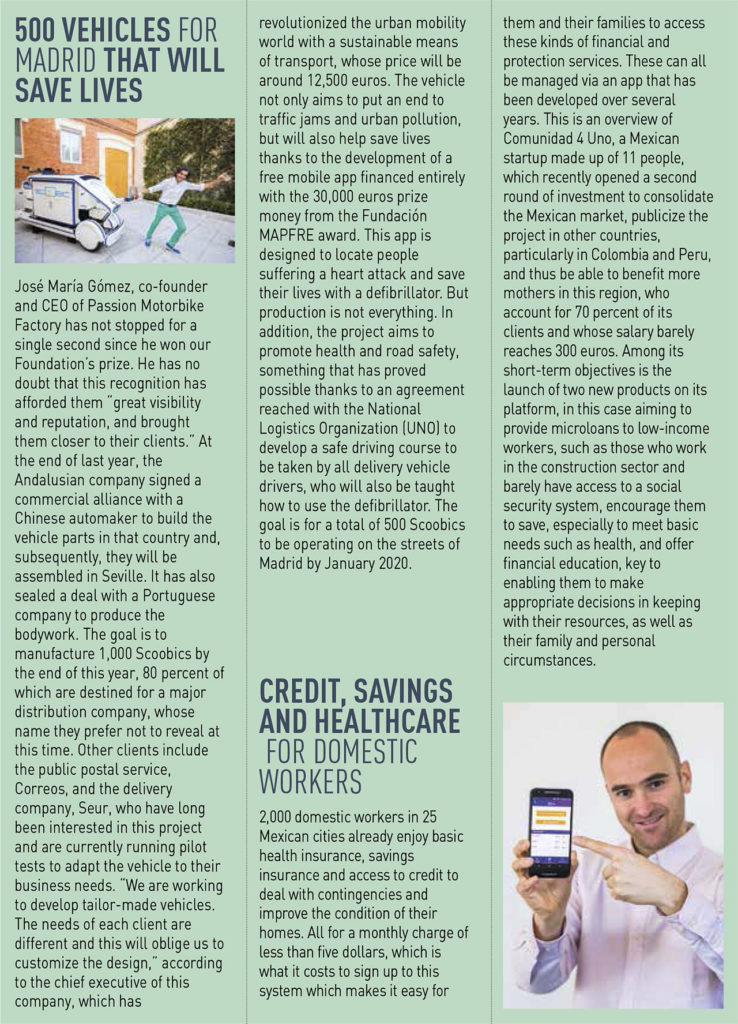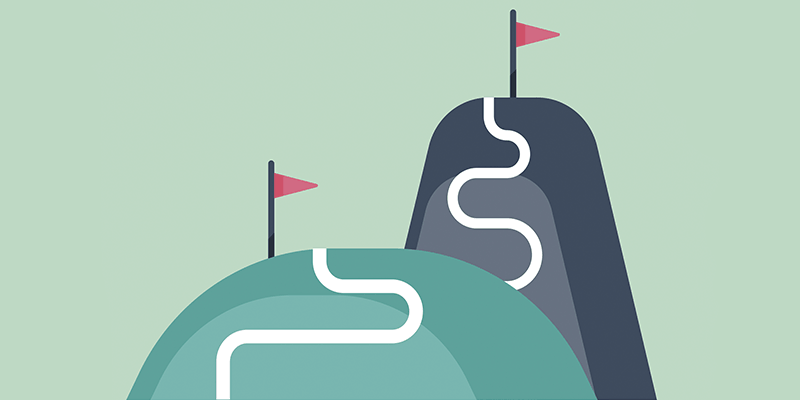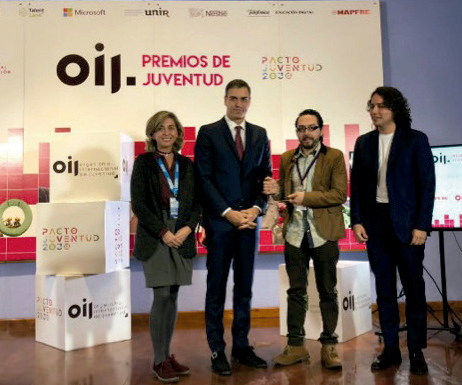Fundación MAPFRE continues this year fully committed to innovation, creativity and entrepreneurship so as to achieve a fairer world. The second edition of the Fundación MAPFRE Social Innovation Awards gets off to a flying start with the goal of identifying great projects capable of enhancing the lives of people right around the globe.
TEXT NURIA DEL OLMO | PHOTOGRAPHY MÁXIMO GARCÍA
More than 230 social innovation projects devised by researchers, entrepreneurs, scientists and students from universities and business schools in 26 countries have already signed up for the second edition of the Fundación MAPFRE Social Innovation Awards.
The candidates have presented innovative solutions, with huge potential for social transformation and a global impact, and a common goal: to improve health, safety and sustainable mobility, three aspects that are essential for social progress.
The Jury for the Fundación MAPFRE Social Innovation Awards recently selected the 27 most innovative ideas. These projects are from 11 countries: Argentina, Brazil, Chile, Colombia, Denmark, Spain, Guatemala, Luxembourg, Mexico, Portugal and the United Kingdom, and will be competing in three semifinals to be held in June in Mexico City and São Paulo, and in Madrid in July. The final will then be held on October 10 in Madrid.
Launched by Fundación MAPFRE at the end of last year in collaboration with IE University, this initiative aims to promote creativity, entrepreneurship and leadership as tools to achieve a fairer world, as well as to promote values such as sustainability, integration and equal opportunity.
Collaborative economy
Generating innovative ideas collaboratively and proposing alternatives for their successful implementation, thanks to the exchange of specialist know-how and the mutual support of innovators all over the world, is the Innova network’s objective.
This is a private community of social innovators made up of the semifinalists who participated in the first edition of these awards, set up recently as one of Fundación MAPFRE’s most significant initiatives this year.
The 27 who classified for this edition will also form part of this network, in which most of its members have been actively involved since its creation. This opens up a wide range of opportunities for entrepreneurship through cooperation, thus helping to transfer this know-how to society at large.
Nine projects to improve health and boost healthy lifestyle habits
These are the nine projects within the e-Health (improving health) category: Arrhythmia (Spain), a bracelet to monitor and detect cardiac arrhythmias, and help prevent a stroke; Fallskip (Spain), a simple application that, in little more than two minutes, calculates the risk of someone suffering a fall; Walk with path (Denmark), a portable device that can be fitted to the shoes of people with neurodegenerative diseases to provide them with visual cues; Burn to give (Chile), a platform that converts the calories a person burns while ex ercising into solidarity calories, which can then serve to feed a malnourished child; Ecglove (Mexico), a glove that swiftly informs a physician on the heart of a person in a critical condition and thus greatly reduces the time needed to attend the patient; and Kitsmile (Colombia), a project designed to rehabilitate children with cerebral palsy by means of a modular chair, apart from offering personalized advice on healthy eating and physical activity for these children and their families.
Three projects from Brazil also classif ied: Especialmente Educando, a keyboard that facilitates the use of computers and mobile devices for people with limited movement or a lack of fine motor coordination; Neurobots, a rehabilitation system for people who have suffered a stroke, by fitting an exoskeleton device to the paralyzed hand that uses sensors in the brain to facilitate moving the hand; and Savelivez, a platform that helps automate the process of getting blood donors as they are needed to blood banks and hospitals .
Nine solutions to encourage social protection and access to the insurance culture
In the InsurTech category, we have nine technological ideas: Cubelizer: (Spain), a permanent monitoring service for the elderly that alerts an assistant in the event of them suffering an accident or falling sick; Green Urban Data (Spain), software that informs us on the environmental status of our cities and facilitates decision-making and prioritizing climate change strategies; Ibisa (Luxembourg), a platform that promotes inclusive insurance for the protection of farmers’ crops all over the world; Kimmo (Mexico), an application that allows drivers to purchase auto insurance adapted to suit the way they use their vehicle; Mecubro. com (Argentina), a platform that offers the possibility of immediately taking out personalized temporary insurance online; and Mibkclub (Colombia), an initiative that seeks to improve the quality of life and well-being of families with scant resources by offering them access to savings and insurance.
In Brazil, the semifinalists in this category are: 88Insurtech, a digital platform based on blockchain technology for security-related and assistance services, facilitating swift connections between insurance brokers and clients; Manejebem, a social network for small farmers that provides remote technical assistance and thus assists sustainable rural development; and Psyalive, a platform that offers the possibility of consultations with a psychologist from anywhere in the world, thanks to a video call.
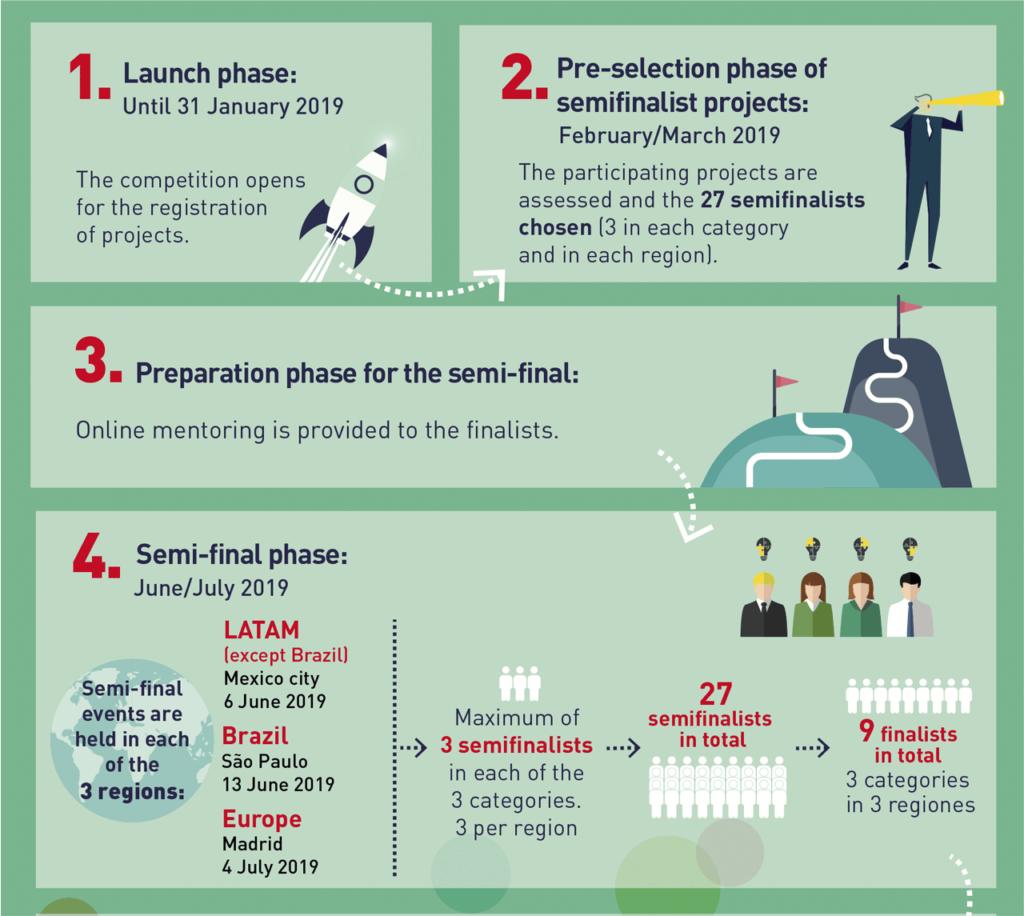
Nine projects to reduce accident rates and rationalize traffic flows
Those who classified in the sustainable mobility and road safety category are: Mobilized Construction (UK), a sensor that is installed in vehicles with the aim of analyzing road conditions in real time; Navilens (Spain), a pioneering system that enables people with visual disabilities to get their bearings wherever they are, thanks to markers placed in different locations which can be read by their cell phone; Pavnext (Portugal), a device installed in the pavement material, capable of automatically reducing the speed of vehicles; Caminito de la escuela (México), a web platform that provides information about the degree of danger in the vicinity of schools, thanks to public collaboration; Shutoff App (Guatemala), a mobile application which, among other features, on detecting speeds over 20 kilometers an hour, locks the smartphone, thereby avoiding distractions at the wheel; and Wheels Social (Colombia), a digital platform to encourage the use of car-sharing, taxi services or bicycle rides, interacting solely with acquaintances within your network of trust.
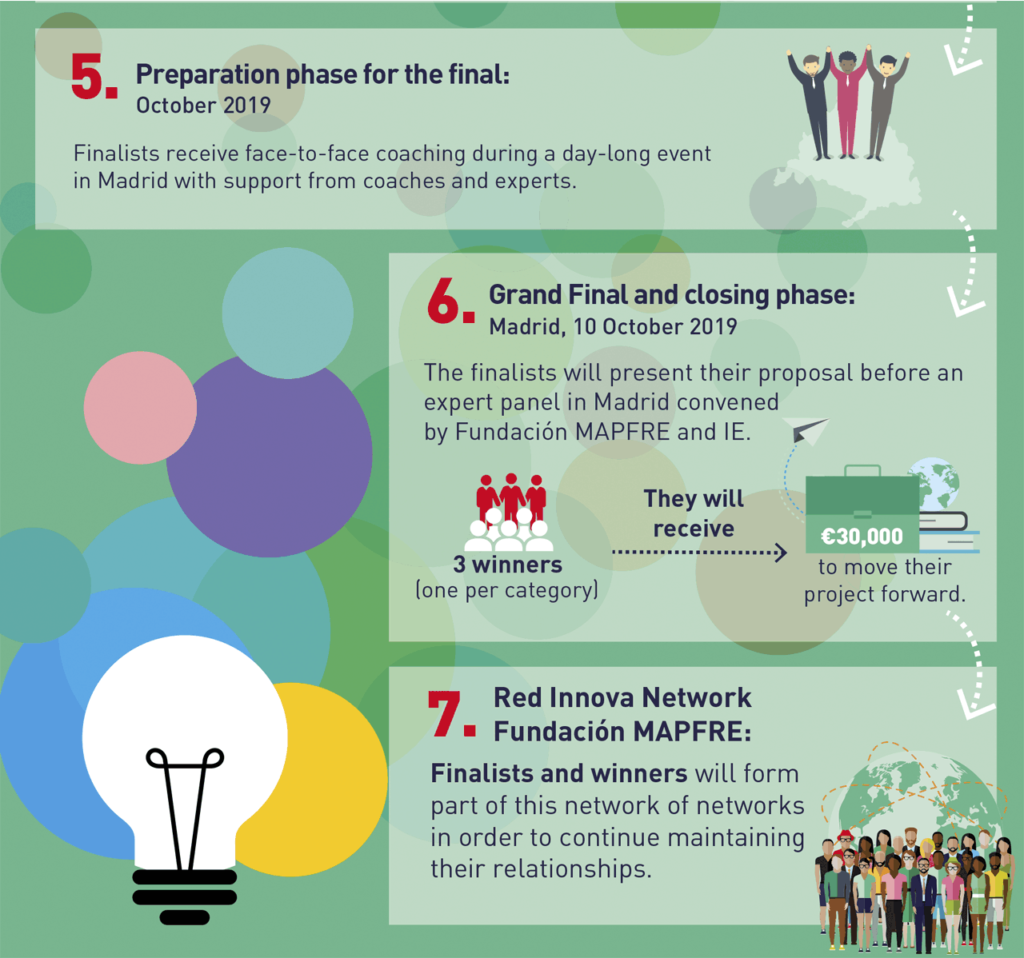
In Brazil, the three semifinalists in this category are: Carona a pé, a system that organizes groups of children living near each other so that families and teachers can accompanying them to and from school; Milênio Bus, a platform that informs users in real time whether a public transport bus is full and facilitates the online payment of tickets; and Venuxx, another collaborative digital platform exclusively for women, serving their transportation needs, whether as drivers or passenger, so as to enhance their safety.
Mentoring, coaching and visibility to investors
The 27 semifinalists will benefit from different promotion channels for their projects, which will help publicize their endeavors. To this end, they will be receiving support, guidance and assistance to communicate and develop their propositions in the most effective manner through mentoring for semifinalists and coaching for finalists. They will also have access to a public relations plan to enhance the visibility of their projects to potential investors and funders.
